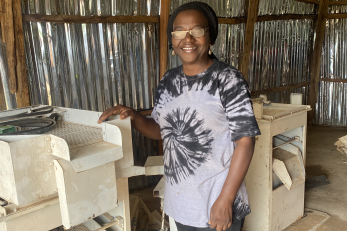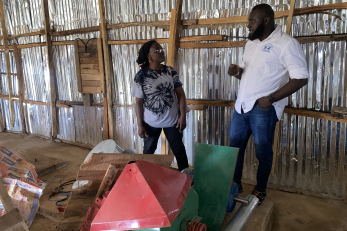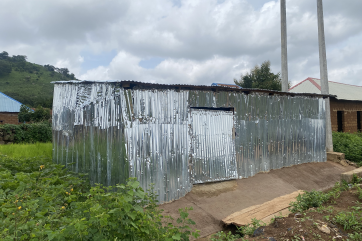From setbacks to success: Getrude Basorun is transforming agribusiness

According to the World Bank, 20% of the workforce in Nigeria is in agriculture, but female participation in the sector is low. This low participation and productivity of women in the agricultural sector come at a significant economic cost.
Adopting gender-equitable policies, such as providing financing and creating fiscal space for women in agribusiness, is essential for bridging productivity gaps. This was evident for Getrude Basorun, CEO of BHG Farms and Agro-Foods Ltd in the FCT, who encountered challenges in securing funds, registering her company, and obtaining the necessary approvals. Founded in 2015, her company, BHG Farms, focuses on adding value to agricultural produce, delivering ready-to-cook products that include grains such as rice, cowpea, and Ijebu Garri, as well as dry fish, plantain chips, Ofada rice, and natural seasonings. In its early growth phase, BHG Farms faced challenges in obtaining the National Agency for Food and Drug Administration and Control (NAFDAC) certification and trademarking.
To make matters worse, the COVID-19 pandemic brought an unexpected setback when her factory was demolished, forcing Getrude to shift operations to her home, demonstrating her resilience. Gertrude also faced the challenge of working alone, without any support or staff.
Before receiving the equipment from RRA, I was the only one operating my cowpea processing business because the company was new, and I had to introduce the products and services that my company provides.
Gertrude, Agribusiness owner

Based on the revenues she generated from her business, she established a new factory in the Kagini community of the Federal Capital Territory (FCT), and Getrude's fortunes began to improve. She employed one person to support her business operations. It was at that time that Mercy Corps, through the USAID-funded Feed the Future Nigeria Rural Resilience Activity (RRA) supported her with cowpea processing equipment. This marked a turning point, allowing her to scale production and employ more people due to an increase in demand for her products. The impact of this growth is now extending beyond her immediate business.
“I have just built a new factory in Bwari LGA, Abuja, and will commence operations here soon in partnership with one of the cowpea processors in Abuja,” Getrude shares, adding that the factory will employ at least five people and operate as a cooperative involving smallholder farmers.
Getrude’s journey to success began with her recognition as a YouWin Awardee, through the Business Plan Competition (BPC) of the YouWin program launched by the Nigerian government under former President Goodluck Jonathan.
“I am a YouWin Awardee. The YouWin program was active for three years (2011-2013). I applied for the 2012 edition and was among the 1,200 awardees; I was awarded 10 million Naira to support my business.”
This grant enabled her to establish her first factory, purchase essential food processing equipment, and secure NAFDAC certification for processing fish and plantain products. Over the years, her product range expanded to include ten different varieties, such as Ofada rice, iru powder, plantain chips, Ijebu garri, sorted ground beans, oven-dried catfish, and fillets.

One of Getrude's ambitions is to transform her factory at Kagini community into a hub for supporting other MSMEs in their production and NAFDAC certification processes.
“The cowpea equipment grant has greatly impacted my business; without this grant, I would not have thought of having a branch in Bwari local government area, Abuja, and I would not have seen the need to have a cooperative where we could incorporate smallholder farmers.”
The grant not only facilitated her business expansion but also inspired new ideas for supporting her community and fellow entrepreneurs. As she looks to the future, Getrude is filled with gratitude for the support she has received.
I appreciate Mercy Corps, RRA, USAID, and everyone that was part of this intervention. If not for this intervention, I would have never thought about expanding my business.
Gertrude continues to lead BHG Farms with a steadfast commitment to making nutritious food accessible and convenient. Her vision, blending tradition with innovation, is propelling her company to new heights. She stands as a testament to the power of the right support, proving that women can be transformative entrepreneurs, reshaping the agricultural landscape through innovative approaches to agro-processing.
About the Feed the Future Nigeria Rural Resilience Activity
The Feed the Future Nigeria Rural Resilience Activity is a five-year, US$49 million program funded by the United States Agency for International Development (USAID) to facilitate economic recovery and growth in vulnerable, conflict-affected areas by promoting systemic change in market systems. The Activity is part of the U.S. Government's global hunger and food security initiative. It is aimed at empowering vulnerable households, communities and systems to cope with current shocks and stresses, and to be prepared to withstand future ones.
The Activity is implemented by Mercy Corps, in partnership with the International Fertilizer Development Center (IFDC) and Save the Children (SCI), primarily in the Northeast states of Adamawa, Borno, Gombe, and Yobe. Using market-led approaches, the Activity is moving over 800,000 individuals out of chronic vulnerability and poverty.